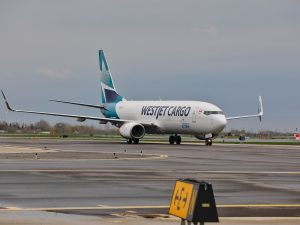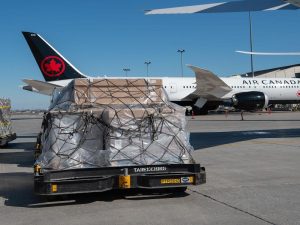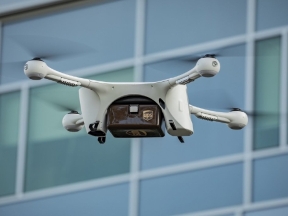Ahead of its Annual Conclave 2023 on May 3rd at Le Meridian in New Delhi, Air Cargo Forum India (ACFI) organized a power packed curtain raiser cum press conference at Udaan Bhavan, DIAL on 25th April 2023 to update the media partners about the key highlights of the event, with the theme Cargo Udaan – Connecting and Empowering Indian Skies. Mr. Satish Lakkaraju, Chairman, ACFI will be moderating the insightful panel discussions on the importance of Air Cargo in today’s world, Mr. Sanjiv Edward, VP ACFI will moderate session on Opportunities and Challenges in International Air Cargo, while, Mr. Keku Bomi Gazder, Member ACFI will be moderating panel discussion on potential of Domestic Air Cargo. Mr. Yashpal Sharma, President informed that they have very interesting line-up of speakers this year, who are air cargo experts. Sharma also stressed that since its inception, ACFI has been striving hard to take up the key issues and challenges with the respective ministries and seeking solutions for the same. The ultimate goal of ACFI is to collaborate and move forward for growth, he said. The event was hosted by Sakshi Gupta, Country Manager, Air Logistics Group. Mr. K S Kunwar, DG ACFI briefed about ACFI’s initiatives. Vote of Thanks was given by Mr. Munish Davessar, Head-Cargo Business Development, Delhi International Airport Limited.
Read More »WestJet Cargo, GTA Group launch three B737-800 converted freighters
WestJet Cargo together with the GTA Group launched three 737-800 Boeing Converted Freighters in Toronto and in Halifax. The event marks the start of a dedicated cargo service designed to fulfill the large-scale needs of businesses, freight forwarders, shippers and individual customers across an expanding network. WestJet Cargo and the GTA Group’s dedicated freighters will now begin operating between six stations in Halifax, Calgary, Los Angeles, Miami, Toronto and Vancouver. Integrating into WestJet Group’s existing network, WestJet Cargo and the GTA group’s dedicated freighters will work in tandem with the cargo carrying bellies of WestJet’s existing fleet of over a hundred 737 aircraft and use the group’s highly skilled 737 pilots. With a payload of 23 tons, the three freighters will have a weekly capacity of over 1500 tons. Their operation will create global connectivity and open trade lanes between Canada and the Caribbean, Europe, Japan and the United States. In addition to the broad range of commodities already carried by WestJet Cargo such as perishables, e-commerce and live animals, the dedicated freighters have enabled a broad expansion of the carrier’s service offerings, including the capacity to carry oversized items and unitized e-commerce containers.
Read More »New British cargo airline ‘One Air’ to serve ME, UK, Europe
The United Kingdom has launched new British cargo airline, One Air. The new airline has been awarded its Air Operators’ Certificate by the UK Civil Aviation Authority (CAA). One Air has dry leased its first B747 freighter and is now the only UK operator of the B747. After successfully completing its proving flight in July 2022 and following a rigorous application process for an Operating License, the new airline is now fully approved to commence operations. One Air expects initial demand for flights from the UK to Europe, the Middle East and Asia regions. It will also ultimately offer freighter services to China and the US. Its business model calls for the addition of a second B747-400 during 2023. Headquartered in Kingston, close to London Heathrow, One Air has recruited a team of 90 air cargo and aviation professionals for its launch, including ground operations, engineering and maintenance, crew training, crew management, finance and HR specialists, and a 40-strong air crew with pilots recruited from Cathay Pacific, Emirates Airline, Norwegian Airlines, and other major carriers. One Air is majority-owned by CEO, Paul Bennett, who stated: “The important role freighter services played in supporting the UK economy and the public throughout the pandemic demonstrated the level of demand which exists for a British cargo airline. We are proud to be meeting this need and to have the opportunity to leverage longstanding business relationships with freight forwarders, logistics providers, and charter brokers serving the UK market. We expect to add our second 747F later this year and have the financial resources to grow in line with the level of demand we see.” The airline will review its fleet plans, including the potential …
Read More »Qatar Cargo re-launches its Next-Gen pharma product
Qatar Airways Cargo announced the re-launch of its Pharma product in line with its Next Generation and VISION 2027 strategy. The re-launch includes several enhancements that benefit its customers and streamlines the handling of different categories of pharmaceuticals and healthcare products, including animal healthcare items that fall under the umbrella of Pharma. “In less than a decade, Qatar Airways Cargo has grown to become an acknowledged carrier of choice when it comes to pharmaceutical products,” says Guillaume Halleux, Chief Officer Cargo at Qatar Airways. “Since we first launched our pharma service in 2014, we have invested heavily to bring on board the best industry experts, equipment, and training. We have also proactively involved ourselves in leading industry working groups* to keep a finger on the pulse of this ever-evolving market.” From the current offering of two sub-categories, the cargo carrier now offers five product sub-categories – Pharma Critical Advanced, Pharma Critical Passive, Pharma Advanced, Pharma Passive and Pharma Care. These new enhanced categories enable Qatar Airways Cargo to offer customers a diverse range of solutions to transport their healthcare shipments and ensure optimal handling of all cool-chain pharma products transported on its flights. The airline has also introduced a two-tier system for its 90 approved pharma stations to provide more information and transparency to its customers. This enhancement helps in differentiating between the distinct capabilities available at various stations. Tier 1 stations offer both +2°C to +8°C & +15°C to +25°C temperature-controlled storage, while having the ability to service electronic containers and dry-ice containers. Tier 2 stations offer only one of the two categories of temperature-controlled storage, handle certain temperature-controlled containers or have limited storage capacity. Active container milestone updates …
Read More »Mammoth Freighters aims to achieve certification of 777-200LRs by 2024
Mammoth Freighters expects to complete its first 777-200LR modification by year-end and to achieve an initial regulatory certification by April 2024. The company said it now holds orders to modify 35 777s from passenger to cargo configurations, including nine modified 777-200LRs due for delivery to DHL. Mammoth is also in “advanced stages” of negotiations to sell another 10 of the modified Boeing widebody jets, the Orlando-based company’s vice-president of marketing and sales Brian McCarthy said in reports. He added Mammoth is on track to complete its first modification – that of a 777-200LR due to Canadian hauler Cargojet – by the end of 2022. Orlando-based Mammoth previously aimed to have its “777-200LRMF” modification approved by the Federal Aviation Administration with a supplemental type certificate (STC) in 2023. But the modification’s expected end-year completion likely means the FAA will grant the STC in 2024 – probably by April, said McCarthy. Mammoth expects to receive an STC for its 777-300ERMF conversion about six months after that, he added. Mammoth’s corporate affiliate Aspire MRO is performing the conversion work in a former American Airlines 777 maintenance site at Fort Worth Alliance airport in Texas. Both Mammoth and Aspire are backed by Fortress Investment Group. Mammoth is initially setting up three modification lines at the site, and already working on conversions of two 777-200LRs (former Delta Air Lines aircraft due to Cargojet) and one 777-300ER (an aircraft owned by AviaAM Leasing).
Read More »Air Canada Cargo expands freighter network with B767Fs
Air Canada Cargo has started freighter operations to Basel, Switzerland. With this the carrier has connected one of Europe’s premiere pharmaceutical hubs to its network through its Toronto global hub. “The flights will operate twice per week using Air Canada Cargo’s Boeing 767 freighters,” said an official release. “We are excited to be returning to Basel, this time with our freighters, to serve a key market in Europe for pharmaceuticals,” said Matthieu Casey, Managing Director, Commercial, Air Canada Cargo. “The capability of our freighters, combined with our temperature-controlled containers and cool chain facility at our Toronto global hub, position us to serve this critical market with reliable, year-round service, and ensure these important shipments can move safely and in a timely manner throughout our global network.” Air Canada Cargo’s Basel service is the latest addition to its worldwide freighter network, following the recently launched freighter services to Liege, Dallas, Atlanta and Bogota, the release added.
Read More »Heavy lift drone launched with capacity to fly 50kg over 10kms
Odisha Chief Minister Naveen Patnaik launched the first of its kind heavy lift logistics drone, made by Odisha-based start-up ‘BonV Aero’, which has the capacity to transport 50kg over 10kms. The Chief Minister was at the opening day of ‘Odisha Skill Conclave 2023’, where he also took a trial of the drone. Satyabrata Satapathy, the co-founder and CEO of BonV Aero said during the event, “Start-up has successfully done a trial of this ‘RM001’ Electric Aerial Vehicle carrying 50-kilogram cargo at the altitude of 8000-10,000 feet in the Tawang of Eastern Command of the Indian Army forward post in Arunachal Pradesh. Next, a high altitude trial on 14,000-16,000 feet will be done”. “In its next phase, the startup aims to develop its flagship platform ‘RM002’ that can transport 200 kilograms of freight over 40 kilometres,” he added. He further said that these multi-utility air vehicles are very helpful in the disaster response and the movement of any kind of cargo or goods where surface logistics are either unfavourable or time-consuming.
Read More »DHL Express orders 9 B777-200LR converted freighters
DHL Express has ordered nine Mammoth Freighters-converted Boeing 777-200LR freighters from lessor Jetran. The first cargo aircraft will be delivered in 2024, with the remaining aircraft to be supplied until early 2027. The 777-200LRs will replace DHL’s older Boeing 747 freighters as part of the sustainability-focused plan to modernise DHL Express’ long-haul intercontinental fleet. DHL Express said ordering converted freighters with a shorter useful life provides an efficient bridge between current and new airframe technologies, such as those used with the new generation 777-8F and Airbus A350F widebody freighters. “We are excited to welcome Mammoth-converted 777-200LRFs to the DHL Express family,” stated Robert Hyslop, executive vice president global aviation at DHL Express. “With the modernisation of our intercontinental fleet, we can simultaneously enhance our proven ability to meet growing demand, improve our environmental footprint and deliver best quality service to our customers. “We are pleased to continue demonstrating to partners and customers alike how these advancements elevate our service and bring us closer to our Sustainability Roadmap goals.” The Mammoth converted 777-200LR freighter has similar characteristics to the production freighter. With a payload capacity of 102 tons and a range of 9,200 km, the 777F has the largest capacity and range of all twin-engine freighter aircraft and is more reliable than older B747 planes, said DHL Express. It is also more fuel-efficient and reduces CO2 emissions by 18% compared to legacy airplanes. Between 2018 and 2022, DHL bought 28 new 777-200Fs from Boeing – 18 of those aircraft are currently in service. The remaining aircraft will be delivered from 2023 to 2025. The aircraft form a key part of DHL’s intercontinental air network, in which DHL Express operates more than …
Read More »Natilus starts autonomous cargo drone flights
Californian autonomous cargo aircraft developer Natilus has successfully completed multiple flights of the subscale prototype of its 3.8 ton payload unmanned aerial vehicle (UAV). The flight tests for the ‘Kona’ short-haul UAV mark a significant milestone for Natilus by validating wind tunnel tests conducted over three years, testing the aerodynamic performance of the Natilus blended-wing-body (BWB) aircraft design. The subscale prototype of the domestic feeder aircraft took off from a private runway in Southern California and reached speeds of 70 mph. Natilus said one the key challenges with the BWB design has been stability – and the test flights validated that the Natilus configuration can fly without the help of a complex autopilot system. “We are fully focused on completing the full-scale Kona prototype,” stated Aleksey Matyushev, Natilus co-founder and chief executive. “Our Kona remotely piloted aircraft will be capable of carrying over 9,000 pounds (4.3 metric tons) of freight and will open new markets worldwide. “The progress of Natilus developing autonomous cargo aircraft is a game-changer in the logistics industry, providing an efficient and cost-effective solution for shipping goods across oceans.” Natilus has also recently completed the full-scale prototypes of both vertical tails. The company will receive Hartzell propellers in May, gearing up for the manufacture of the engine test stand. The 85 ft full-scale Kona demonstrator, the smallest of the Natilus fleet, will be the largest commercial air cargo drone targeted to fly in 2024, said the company.
Read More »FIATA, GSF unite to enhance data efficiency in int’l trade
FIATA, the International Federation of Freight Forwarders Associations, and the Global Shippers Forum (GSF) have jointly issued an agreed Charter for Protection and Governance of Data in International Trade. The agreement sets out the arrangements for data security and confidentiality, which digital booking and trading platforms operators and users must adopt and incorporate in their End-User Agreements (EUAs). Recommendations in the Charter seek to enable a safe and trustworthy environment for conducting business based on a level playing field, said release. The Charter has been approved by members of both organizations and is believed to be the first declaration of rights for platform users in the trade and logistics sector. Dr. Stéphane Graber, Director General of FIATA notes that “FIATA is committed to enabling the shift of trade from analog to digital form to increase efficiency and resilience of global supply chains. In this journey, interoperability between platforms and their credibility amongst users is critical for success. This requires clear and fair rules on data exchange to protect the confidentiality and ensure trust between stakeholders. FIATA is happy to lead this effort with GSF on the crucial topic of data governance and protection.” James Hookham, Secretary General of GSF said, “Digitalisation of international trade and transport paperwork offers huge savings and benefits for all parties in the supply chain, but its storage and processing comes with risks of loss, leakage, and unauthorized use that could expose commercially sensitive patterns and trends.” Additionally, he commented, “Our Charter sets out reasonable expectations of the protections that should be in place to respect the ownership of the data, protect its confidentiality, and guard against unauthorized access and use”.
Read More » Cargo Breaking News
Cargo Breaking News









